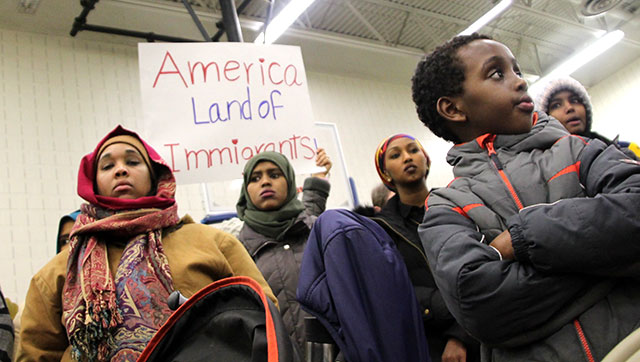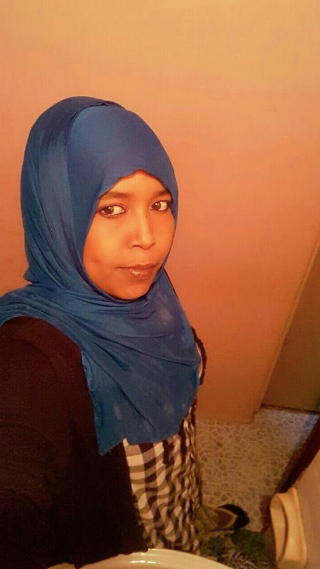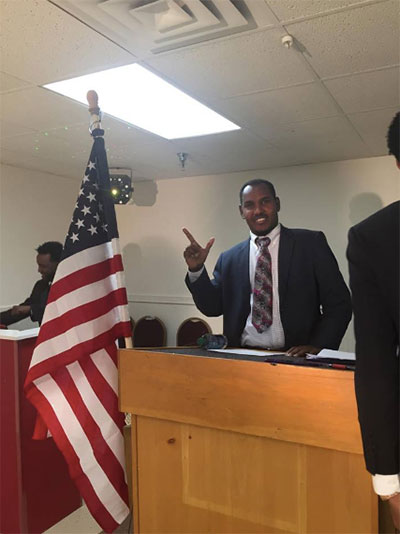
In 1999, in the midst of a bloody civil war, Omar Podi moved from Somalia to a refugee camp in Kenya. In 2005 he was selected for resettlement in the United States and after countless vetting interviews and UNHCR screenings, Podi’s move was approved. In 2007, Podi arrived in the US, settling in St. Louis, Missouri, then moving to St. Cloud, Minnesota, where he works with youth and has served as an interpreter. However, when Podi boarded that plane bound for the United States, he didn’t get to bring his wife. Nine years later, Nafisa Omar Mohamud remains in a Kenyan refugee camp, 8,000 miles away from her husband.
Last Thursday, Podi said he was expecting Nafisa to arrive soon. She began her resettlement process in 2014 and was scheduled for her medical examination, the final step before travel, in the coming days. That all changed Friday, when Donald Trump signed an executive order banning Nafisa Omar Mohamud from entering the United States. Now, Podi says, if Mohamud can’t get her visa, “the best thing I can do is move back home.”
The order, titled “Protecting the Nation From Terrorist Attacks by Foreign Nationals,” is intended to combat the threat of terrorist extremism. The order suspends refugee admissions for 120 days from the signing of the order. A separate order signed concurrently suspends any travel with any visa — including refugees arrivals and US residents traveling on green cards — from Iraq, Iran, Syria, Sudan, Yemen, Libya and Somalia until new rules are in place for vetting.
 Nafisa Omar Muhamud, in Dadaab Refugee Camp, Kenya. (Photo: Omar Podi)When refugees are allowed into the US again — and there’s no guarantee when that will be — those facing religious persecution will be given priority, but only “provided that the religion of the individual is a minority religion in the individual’s country of nationality.” In other words, if you’re Muslim from a nation predominantly comprised of Muslims, like Nasifa Omar Mohamud, you are not going to qualify. But if you’re Christian, you’re in.
Nafisa Omar Muhamud, in Dadaab Refugee Camp, Kenya. (Photo: Omar Podi)When refugees are allowed into the US again — and there’s no guarantee when that will be — those facing religious persecution will be given priority, but only “provided that the religion of the individual is a minority religion in the individual’s country of nationality.” In other words, if you’re Muslim from a nation predominantly comprised of Muslims, like Nasifa Omar Mohamud, you are not going to qualify. But if you’re Christian, you’re in.
Implementation of these executive orders has already led to chaos. Airports around the world have detained refugees on their way to the US. The ACLU launched a legal challenge that led a federal judge to issue a stay on orders to detain travelers with legal visas. It was even reported that Homeland Security was ignoring that stay, and enforcing Trump’s initial order to detain and return refugees.
White House chief of staff Reince Priebus told “Meet the Press” that Customs and Border Patrol agents have “discretionary authority” to question any US citizen from the seven banned countries, even though the order protects all US citizens while traveling.
In essence, Trump has “turned the rules upside down” when it comes to refugee resettlement, says Jane Graupman, executive director at the International Institute of Minnesota. “Trump could have done this in an ordered way that was not so disruptive,” Graupman said, clarifying that she would have opposed any such order but emphasizing how much worse Trump’s order is even than what Bush did after 9/11. Bush “stood with religious leaders and said this is not about Islam, this is not about discrimination,” she said. “We are just not hearing anything like that.”
Instead, organizations are left scrambling. No one seems to know exactly what the order does or does not allow. That chaotic implementation has left lives in limbo. More than 200 refugees arrived every day between January 1 and January 20 of this year. “They’re kids, single moms, usually it is family reunification,” said Graupman.
International Institute of Minnesota has housing down payments and furnishings secured for four families coming this week. “They’ve waited for decades,” Graupman said. “The average refugee has lived 20 years in a refugee camp. They have passed 12 security clearances and medical exams and have plane tickets. I don’t know what more vetting there can be.”
Tomorrow two of those families were expected to arrive, Somali families both. One was departing from South Africa and another from Dadaab Refugee Camp in Kenya (the same camp where Nafisa Omar Mohamud lives). Both arrivals are no longer on the list. Asked where they are now, Graupman couldn’t say. “They must have left their camps by now if they’re getting here on Tuesday,” she said.
 Omar Podi, a refugee from Somalia who was allowed to move from a refugee camp in Kenya to the US in 2005, had been waiting more than 10 years for the US to let his wife Nafisa Omar Mohamud leave the camp and join him. Trump’s executive order has now rendered that impossible. (Photo: Courtesy of Omar Podi)These stories are common in refugee communities. Leila Ahmad told me her brother’s family of 12 had tickets for a flight last June. That flight was canceled when a financial dispute between the Ethiopian government and the International Organization for Migration arose. After the cancelation, the family’s medical examination expired. A new one wasn’t scheduled until December, and now, approved once more, they are barred from entry. It was the last opportunity for Ahmad’s family indefinitely. Another Somali refugee, Sahra, was expecting her mother, brother, sister, nephew and niece next week. She has no idea if they’ll make it.
Omar Podi, a refugee from Somalia who was allowed to move from a refugee camp in Kenya to the US in 2005, had been waiting more than 10 years for the US to let his wife Nafisa Omar Mohamud leave the camp and join him. Trump’s executive order has now rendered that impossible. (Photo: Courtesy of Omar Podi)These stories are common in refugee communities. Leila Ahmad told me her brother’s family of 12 had tickets for a flight last June. That flight was canceled when a financial dispute between the Ethiopian government and the International Organization for Migration arose. After the cancelation, the family’s medical examination expired. A new one wasn’t scheduled until December, and now, approved once more, they are barred from entry. It was the last opportunity for Ahmad’s family indefinitely. Another Somali refugee, Sahra, was expecting her mother, brother, sister, nephew and niece next week. She has no idea if they’ll make it.
Refugees coming to the US are leaving trauma in exchange for safety and a new start. “They’ve been in refugee camps; they’ve seen unspeakable things,” Graupman said. Things that Americans cannot even imagine.” And now, the US won’t let them in.
The only thing keeping these families out is their religion.
The order doesn’t explicitly declare itself a ban on all Muslim entry into the United States, but in practice the order is effectively a step toward such a ban. Former New York City Mayor Rudy Giuliani, who worked with Trump on the language of this order, confirmed as much to Fox News yesterday. President Trump, however, in an interview with ABC, insisted that this major immigration change “is not the Muslim ban, but it’s [against] countries that have tremendous terror.” Terrorist attacks, however, have not come to the US via refugee resettlement; since the 1980 Refugee Act was passed, not a single person in the US has been killed by a refugee.
The flow of Muslim refugees into the United States has been steadily increasing, as the global refugee crisis continues. In 2016, the US admitted 38,901 Muslim refugees, more than any previous year, and only the second time in history that more Muslims refugees arrived than Christian. More than half of those came from two countries: Syria and Somalia. Other nations with large resettlement populations include Iraq and Burma. Only Burma is exempted from Trump’s list of barred nations.
Especially galling for many who work in refugee resettlement is the inclusion of Iraq on the list of banned nations. Refugees from Iraq receive Special Immigration Visas (SIV), a designation that protects their travel because of their work with the US Military. “It’s not an overstatement to say that these people literally put their lives on the line for the US,” Graupman said. “It’s very confusing that any president would ban SIVs.”
Republican Senator John McCain agrees. On Sunday, McCain criticized Trump’s executive orders, taking special aim at the inclusion of Iraq. “Is Iraq the same as Iran?” McCain asked on Face the Nation. “Of course not.” He also said that Trump’s policy would provide “ISIS [also known as Daesh] some more propaganda.”
By barring entry from Iraq, “President Trump has thrown out the baby with the bathwater,” Bob Oehrig, director at Arrive Ministries told Truthout. “It does not provide for refugees from Iraq that helped our military at great personal risk.”
Resettlement agencies and refugee service organizations are staying on task amid the uncertainty that accompanies such a sweeping change. Everything is up in the air now. That includes urgent needs, like getting detained travelers to a safe destination. But also new organizational challenges, like finding the dollars to retain staff during a four-month ban on refugee arrivals, Graupman said.
Trump portrays his order as a measure to keep the US “safe,” but the basic facts of the situation expose that framing as misguided. Refugees coming to the United States are not terrorists. Often, they are fleeing terrorism. “They’re desperate, and they want to get resettled and get a life for their children,” Graupman said. “Go to school, get a job and get an education. They are grateful to be here.”
Jaylani Hussein, executive director at the Minnesota chapter of the Council of American Islamic Relations, said in an email that Trump’s order would not improve US safety or security. “Rather,” he said, “it will reinforce fear, hate and division within our country.”
In the meantime, Omar Podi and countless others are left wondering whether the Trump administration will ever allow their loved ones to achieve their promise of a new home in the US.
Media that fights fascism
Truthout is funded almost entirely by readers — that’s why we can speak truth to power and cut against the mainstream narrative. But independent journalists at Truthout face mounting political repression under Trump.
We rely on your support to survive McCarthyist censorship. Please make a tax-deductible one-time or monthly donation.